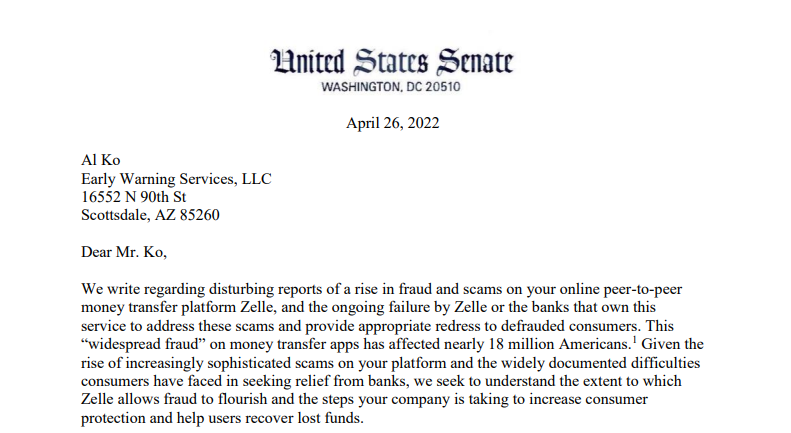🏦 Zelle Scams and Fraud are running wild 18 Million Consumers Affected in US

Zelle is peer-to-peer payment network used by more than 1,000 banks and banking apps. Like other P2P services, Zelle makes it easy to send money to friends and family using their email addresses or phone numbers. But as convenient as it can be for you, it’s also that convenient for scammers who want to steal your money.

Zelle was introduced in 2017 by a company created by some of the U.S.’s largest banks. Given its connection to the banks, Zelle grew quickly, driving over $490 billion in transactions in 2021, twice as many as its nearest competitor Venmo. But Zelle’s immediacy made it a “preferred tool for grifters,” leading to widespread fraud and scams across the platform.
Widespread fraud on money transfer apps has affected nearly 18 million Americans.
Recently Senators Warren, Menendez, Reed sent a letter to Zelle Parent Company on Failure to Address Consumer Fraud and Scams.

“Alarmingly, both your company and the big banks who both own and partner with the platform have abdicated responsibility for fraudulent transactions, leaving consumers with no way to get back their funds. Zelle’s biggest draw – the immediacy of its transfers – also makes scams more effective and ‘a favorite of fraudsters,’ as consumers have no option to cancel a transaction even moments after authorizing it.” And banks have chosen to let consumers suffer, blaming them for authorizing fraudulent transactions,” continued the lawmakers.
According to Consumer Watchdog, banks were essentially “throw(ing) up their hands and saying ‘it’s not our problem because you authenticated it.’” A former executive at your company even argued that banks have not done enough to deter fraud on Zelle, warning that banks had not sufficiently educated consumers about the risks. One customer observed that “it’s like the banks have colluded with the sleazebags on the street to be able to steal.”

“Both your company and the big banks who both own and partner with the platform have abdicated responsibility for fraudulent transactions, leaving consumers with no way to get back their funds.”

Zelle has been asked to answer a series of questions that includes:
1. What are the procedures for rooting out scams on the online platform Zelle, and how has your company adjusted those procedures in light of “rampant […] organized crime” on the platform?
2. What are Zelle’s policies for determining which consumers receive refunds for fraudulent claims?
a. Is this a joint process with the account holders’ bank? If so, are these procedures standardized across all banks and financial institutions using the platform?
3. Does Regulation E of the Electronic Fund Transfers Act apply to the scams seen regularly on Zelle, including those that involve consumers induced into authorizing fraudulent transfers?
a. Under Regulation E, would Early Warning Services, LLC or the account holders’ bank be responsible for refunding the funds?
4. How many reports of fraud from Zelle customers have Early Warning Services received for each of the last five full calendar years, and from January 1, 2022, to the present? For each year, and for the period from January 1, 2022, to the present, please provide:
a. The total number of reported cases of fraud from Zelle customers.
b. The total dollar value of reported fraud.
c. The number of cases where Zelle provided refunds to customers.
d. The total value of these refunds.
e. The number of cases where Zelle referred fraud to law enforcement or to federal or state bank regulators.

In the meantime, consumers who are looking for relief should contact their banks again and cite this letter from Warren and Menendez. No promises that it will work, but it’s worth a shot.
Have you been a victim of fraud while using Zelle? Let us know here.

Disclaimer: Some information on this site may be considered attorney advertising under your state’s laws and ethical rules. This legal news site and its content is for general information only and is not legal advice. Information on this site may be incomplete or out-of-date.
No attorney-client relationship is created between you and any attorney who publishes content or online forms on this site. Hiring a lawyer is an important decision that should not be based solely on advertisements.

